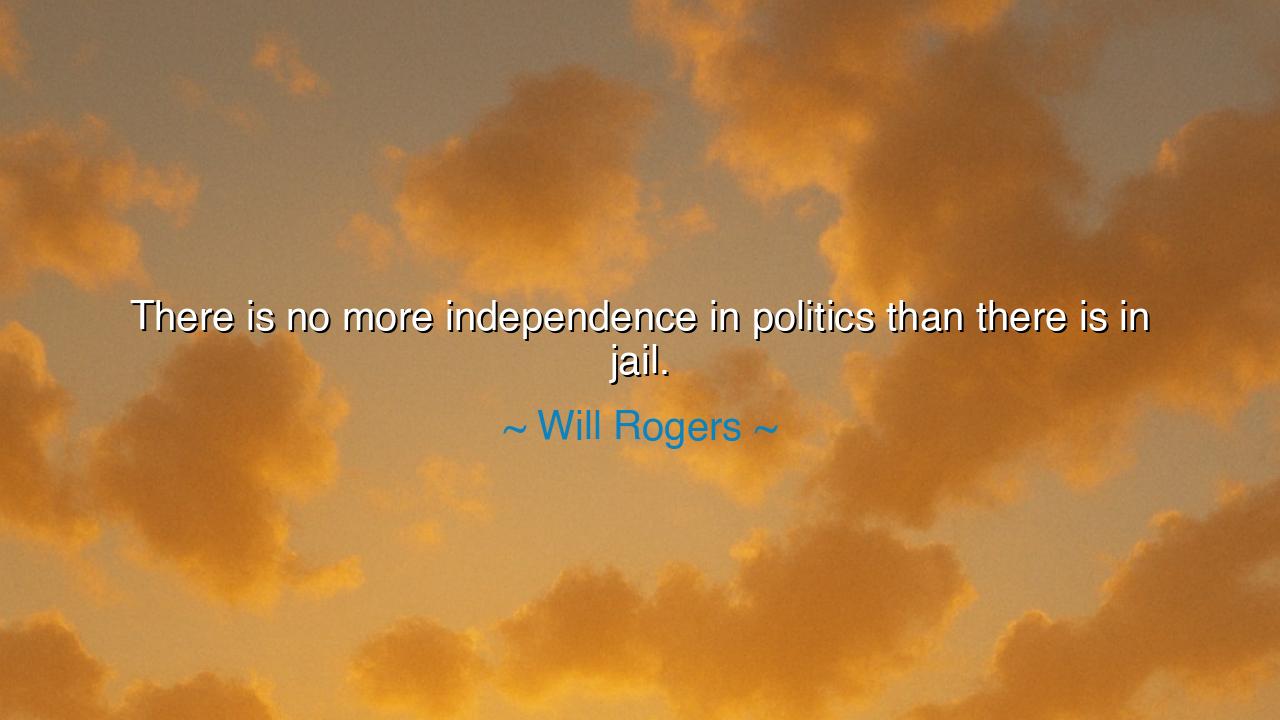
There is no more independence in politics than there is in jail.






Hear now the wry yet timeless words of Will Rogers, that plainspoken sage of the American spirit: “There is no more independence in politics than there is in jail.” At first, his saying seems like jest — the humor of a cowboy philosopher with a twinkle in his eye. Yet beneath its laughter lies a blade of truth, sharp and enduring. Rogers, though a man of comedy, was a prophet of common sense. With these words, he laid bare a truth that rulers and ruled alike too often forget: that politics, for all its promises of liberty, can bind the soul as tightly as any prison cell when it is corrupted by power, partisanship, and pride.
The origin of this quote reaches back to the early twentieth century, when Will Rogers, beloved performer and commentator, looked upon the political world of his time — the roaring age of parties, deals, and self-interest — and saw that those who called themselves “independent” were rarely free. Though they claimed to serve the people, many served instead their factions, their ambitions, or the machinery of influence that kept them in office. Rogers, with his frontier wit, compared such “freedom” to the illusion of liberty one might have behind iron bars. In jail, a man may walk a few paces to the left or right, but he remains a prisoner all the same. So too in politics — where men boast of choice but are hemmed in by loyalty, fear, and the hunger for approval.
The ancients would have recognized this wisdom well. In the courts of Athens, the philosopher Socrates refused to flatter the people or to bend his words to win favor. He spoke truth, not popularity, and for that, he was condemned. When his judges asked why he could not be more “prudent” in his speech, he answered that the freedom of the soul was greater than the safety of the body. In that moment, he proved what Rogers meant: that independence in politics — true independence — is rare, for it demands courage, and courage is often punished by those who live in comfort with falsehood. The man who clings to truth in the halls of power may find himself more imprisoned than the guilty, for he stands alone amid chains of conformity.
Will Rogers saw the same spirit in his own age — senators chained to their parties, journalists shackled to their sponsors, voters bound by slogans instead of reason. He was no cynic, though he wore the mask of one; rather, he was a patriot who mourned the loss of honest discourse. His laughter was medicine, meant to awaken, not to mock. When he said there was “no more independence in politics than there is in jail,” he spoke not to condemn democracy, but to warn it. He understood that when political loyalty becomes obedience, and when fear replaces conscience, freedom decays from within — not by tyranny, but by habit.
Consider also the tale of Cincinnatus, the Roman farmer who was summoned to save his republic from invasion. Given absolute power as dictator, he led Rome to victory — and then, when the crisis was done, he laid down his authority and returned to his plow. He proved that independence in politics means not serving oneself, nor even clinging to power for its own sake, but knowing when to walk away. In him, the spirit of true leadership shone: mastery over ambition, loyalty to virtue above victory. His example stands against the corruption that Rogers mocked — for where Cincinnatus returned to his fields, too many modern leaders remain in their palaces, prisoners of their own pride.
Thus, the quote becomes not a jest, but a mirror. Rogers holds it up to every generation, asking: Are you free, or merely pretending? The man who cannot speak truth to his allies is no freer than the man who sits behind bars. The citizen who follows a party without question has traded his mind for comfort. And the leader who fears to lose his position is already enslaved. True independence, Rogers reminds us, is not a matter of titles or offices, but of conscience — the ability to act with integrity even when the crowd demands otherwise.
O listener, take this teaching to heart. In your own life, whether in politics or in daily dealings, guard your independence of thought as the ancients guarded fire. Do not let the noise of factions drown out the voice of truth within you. Speak honestly, even when it costs you favor. Support leaders who value character above calculation, and beware of those who promise freedom while asking for obedience. Remember that the freest man is not the one with the loudest platform, but the one who answers to conscience alone.
And so, let Will Rogers’ words echo through time, half in humor and half in warning: “There is no more independence in politics than there is in jail.” Laugh, as he would have wished, but then look deeper — for the jest is the truth. Freedom is not found in titles or parties, but in the courage to remain unchained in mind and spirit. Seek that freedom, live by it, and guard it — for when men cease to think freely, the prisons of politics need no walls at all.






AAdministratorAdministrator
Welcome, honored guests. Please leave a comment, we will respond soon